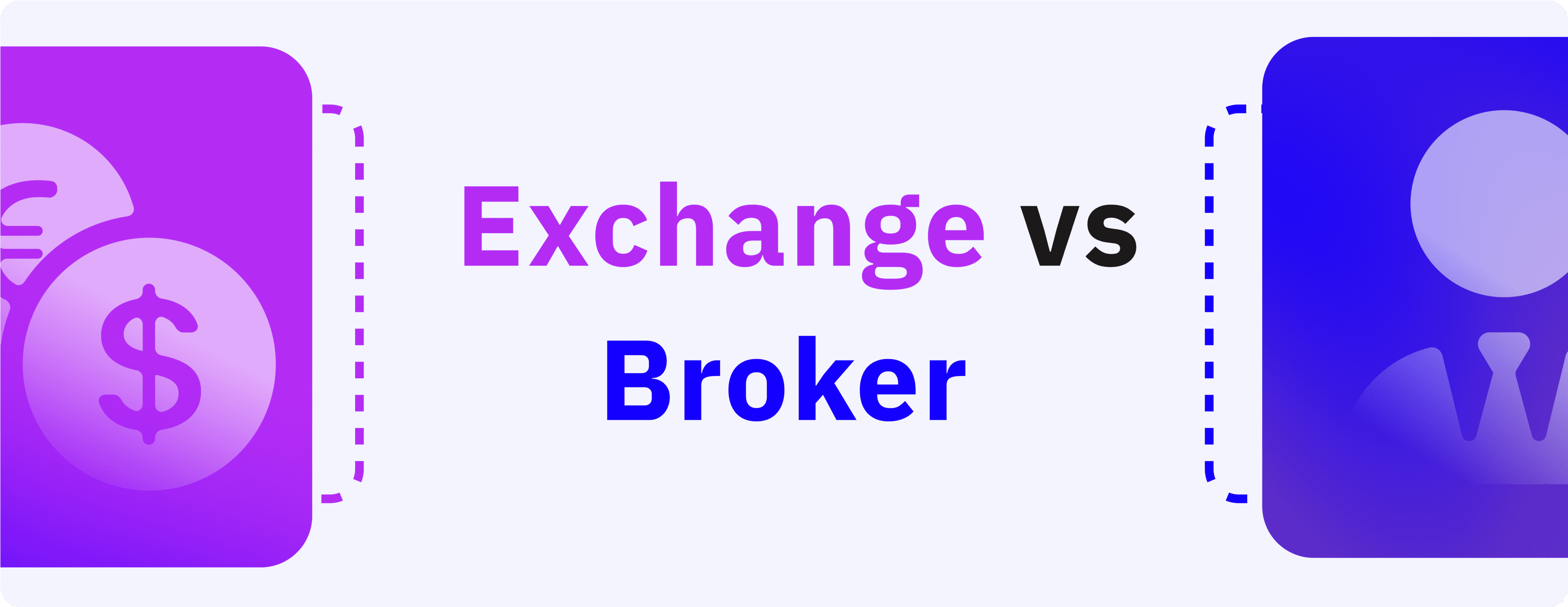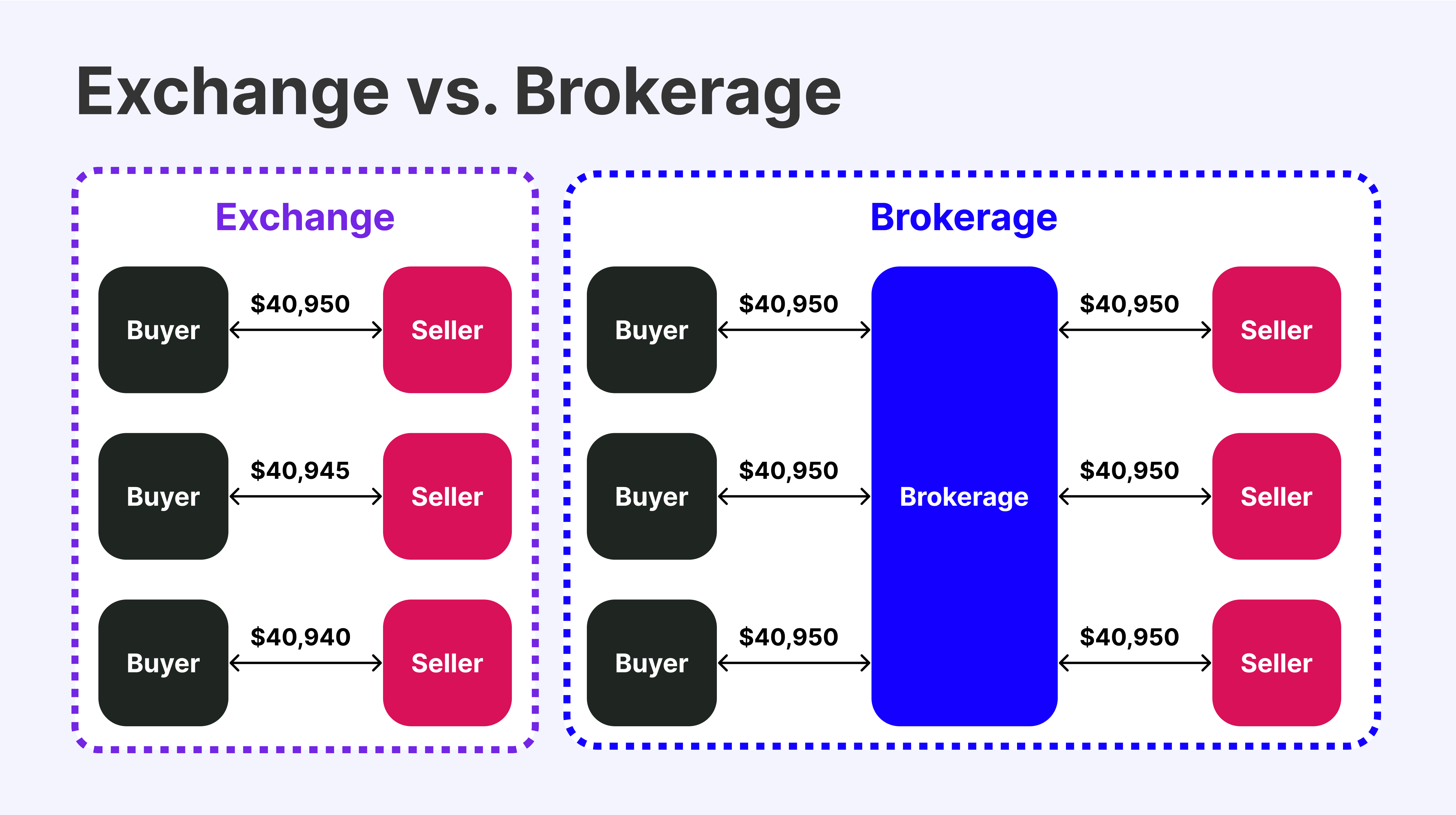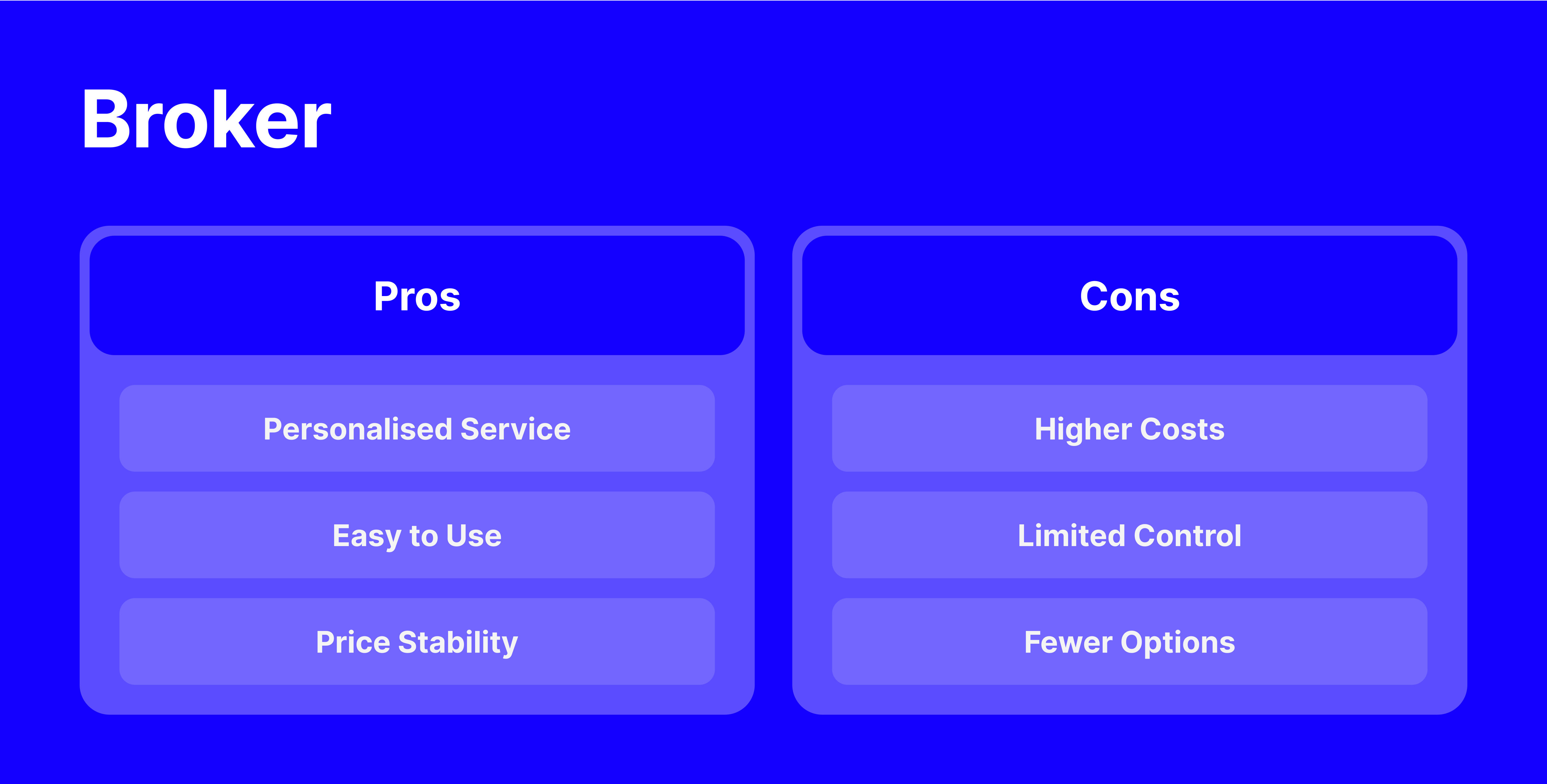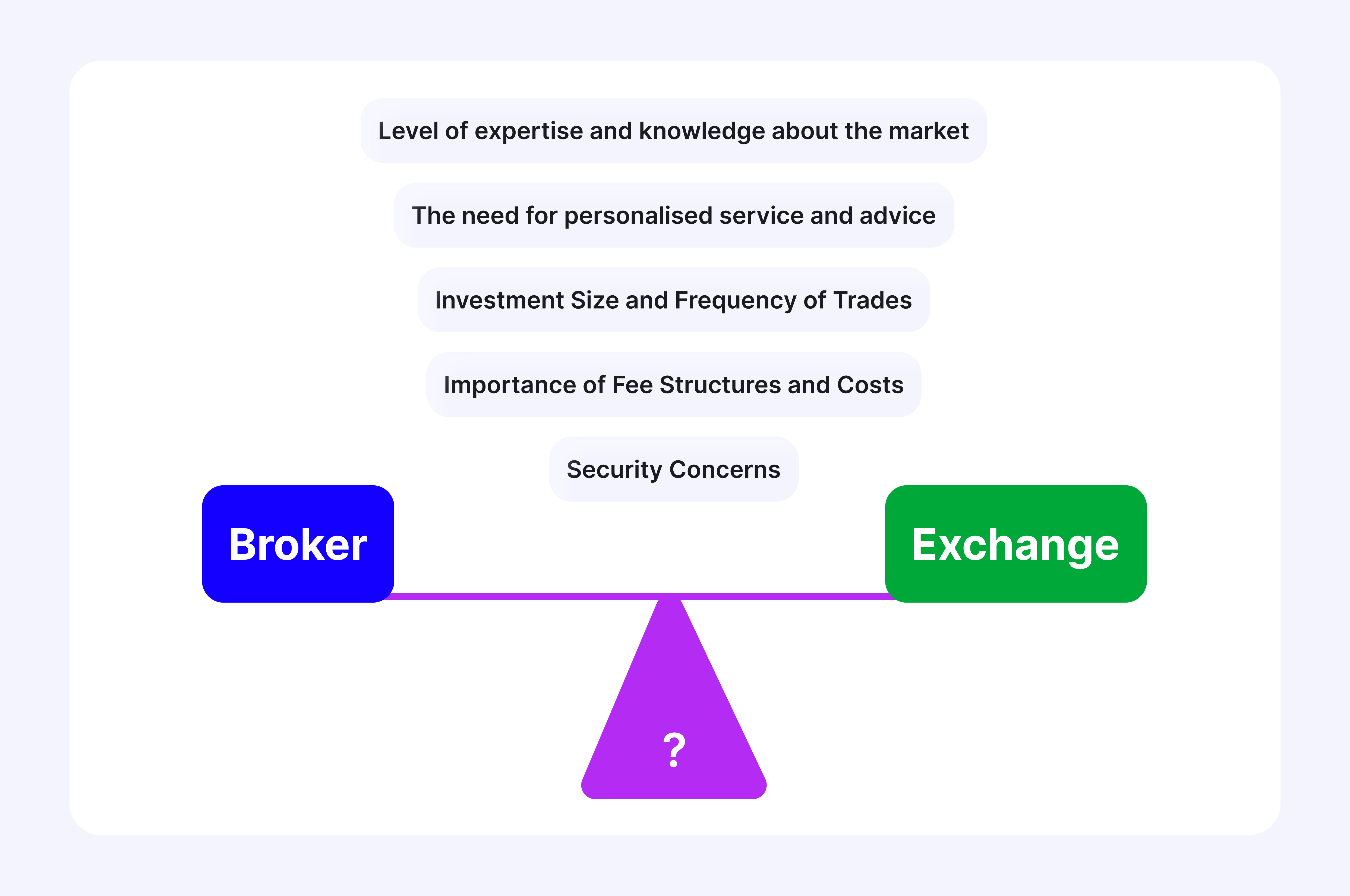What's the Difference Between Exchange and Broker?

 By Anton Boykov
By Anton BoykovSeasoned copywriter with a focused expertise in crypto and fintech, adept at translating complex industry jargon into clear, engaging content. Driven by my mission to illuminate the intricacies of the crypto and fintech industries, my commitment is to create and deliver content that educates, engages, and empowers. I strive to foster understanding, inspire confidence, and catalyze growth in these dynamic sectors, contributing to the forward momentum of our digital financial future.
 By Constantine Belov
By Constantine BelovAs a hard-working, goal-oriented, and well-rounded person, I always strive to do quality work for every job I do. Faced with challenging tasks in life, I have developed the habit of thinking rationally and creatively to solve problems, which not only helps me develop as a person, but also as a professional.
Speaking about my professional activities, I can say that I have always been attracted to the study of foreign languages, which later led me to the study of translation and linguistics. Having great experience as a translator in Russian, English and Spanish, as well as good knowledge in marketing and economy, I successfully mastered the art of copywriting, which became a solid foundation for writing articles in the spheres of Fintech, Financial markets and crypto.

Adapting to the financial world can sometimes feel like learning a new language riddled with complex jargon and intricate concepts. Two terms often encountered yet often misunderstood are 'exchange' and 'broker'. While these terms may seem interchangeable, they are fundamentally different, especially in the fast-paced world of cryptocurrency. Understanding the distinction between a crypto exchange and a crypto broker is essential for anyone involved in this field, from novices to seasoned investors. This article aims to demystify these concepts, presenting a comprehensive breakdown of these critical financial entities.
Brokers provide personalised services and execute transactions for clients, often offering advice for a fee. Exchanges are marketplaces for peer-to-peer trading, letting buyers and sellers set asset prices.
Crypto brokers set fixed prices for digital assets, simplifying transactions. Cryptocurrency exchanges are 24/7 digital platforms where traders swap cryptocurrencies for other assets or fiat, facing higher price volatility.
Brokers and exchanges differ in operation, pricing, security, and user experience.
Choosing between a broker or an exchange depends on one's market knowledge, desire for advice, investment size, fee preferences, and security considerations.

In the complex labyrinth of financial markets, two key players provide the structure and facilitate transactions: brokers and exchanges. Both brokers and exchanges play integral roles in financial markets, but they differ significantly in terms of their functions, operations, and interactions with market participants.
Traditional brokers, or broker-dealers, are professional individuals or firms that are commissioned to buy and sell assets on behalf of their clients. These assets could range from stocks and bonds on the New York Stock Exchange to commodities like gold and oil. Brokers are typically licensed professionals regulated by financial authorities and often have detailed knowledge of market conditions and trends. They may provide advice and personalised service to their clients, helping them navigate the complexities of the financial markets.
In essence, when you place a buy or sell order through a broker, the broker doesn't merely process the transaction. They often provide you with research, advice, and the means to manage and diversify your portfolio. In return, they charge a commission or fee for their service, which can either be a fixed fee per transaction, a percentage of the transaction value, or a combination of both.
With the meteoric rise of digital currencies, traditional brokerage has found its new counterpart in the form of a crypto broker. These brokers function much like traditional brokers but specialise in cryptocurrency transactions. They serve as intermediaries to facilitate the buying and selling of cryptocurrencies like Bitcoin, Ethereum, and many others.
A crypto broker typically offers a simple platform for users to buy or sell cryptocurrencies using fiat currencies. They set their prices for the digital assets, often including a premium, and allow users to transact at these fixed prices. This way, cryptocurrency brokers eliminate the need for users to navigate the complexities of a cryptocurrency exchange, making digital assets more accessible to the average person.

Traditional exchanges, such as the New York Stock Exchange or the London Stock Exchange, act as marketplaces for buying and selling financial instruments like stocks, bonds, commodities, and derivatives. They operate under a regulatory framework that ensures transparency, fairness, and safety for market participants.
Exchanges don't buy or sell the assets themselves but provide the infrastructure that allows buyers and sellers to interact directly. They match buy and sell orders in the market and facilitate transactions. Exchanges make their revenue primarily through transaction fees that traders pay each time they buy or sell an asset.
A cryptocurrency exchange is a digital marketplace where traders can exchange cryptocurrencies for other digital assets or fiat currencies. They operate similarly to traditional stock exchanges but within the cryptocurrency market.
On a cryptocurrency exchange, market participants place buy and sell orders at prices they specify. When a buy order matches with a sell order, the exchange executes the trade and charges a small fee for this service. Some cryptocurrency exchanges also allow for advanced trading features like futures and options trading, margin accounts, and more.
Like their traditional counterparts, a cryptocurrency exchange plays a crucial role in maintaining the liquidity and efficiency of the market. However, crypto exchanges differ in that they operate 24/7 and typically deal with a higher degree of price volatility.
There are key distinctions between brokers and exchanges that should be considered when making financial decisions. Let's take a closer look at the major differences between them.

The distinction between brokers and exchanges can seem complex at first glance, especially with the advent of digital currencies. To understand their unique roles, we need to dissect the primary differences in their modes of operation, pricing structures, security measures, and overall user experiences.
Brokers - Brokers act as intermediaries between buyers and sellers. They provide personalised services tailored to an individual's financial goals and risk tolerance. Both traditional and crypto brokers execute transactions on their clients' behalf. They may offer additional services such as portfolio management, research and analysis, and financial advice. Crypto brokers streamline cryptocurrency transactions. They set the price for digital currencies, eliminating the need for price agreements between buyers and sellers. Their platforms typically support various fiat currencies, enabling direct purchases of digital currencies.
Exchanges - Exchanges, on the other hand, serve as neutral marketplaces facilitating peer-to-peer trading. They allow buyers and sellers to interact directly and determine the prices of assets through supply and demand dynamics. Cryptocurrency exchanges offer users a platform to trade cryptocurrencies for other digital assets or fiat currencies. They provide liquidity, market efficiency, and transparency, allowing market participants to place buy and sell orders, which are then matched and executed by the exchange.
Brokers - Brokers usually charge a commission or spread-based fee for their services. The commission fee is a fixed cost per transaction, while spread-based fees involve charging the difference between an asset's buying and selling price. For crypto brokers, the fee may also be included in the premium they charge for the cryptocurrencies.
Exchanges - Crypto exchanges primarily make their revenue through transaction fees, which are charged each time a trade is executed. Some exchanges also impose deposit or withdrawal fees. These costs can vary based on factors like the user's trading volume, the type of transaction, and the chosen payment method.
Brokers - Brokers, especially those dealing with financial and sensitive information, employ various security measures to protect their platforms. These include data encryption, two-factor authentication (2FA), and the use of secure socket layer (SSL) protocols. Some crypto brokers also use cold storage for cryptocurrencies, meaning they store them offline to prevent thefts.
Exchanges - Crypto exchanges also employ a wide range of security measures, such as 2FA, encryption, and cold storage. However, exchanges have been targets of significant hacking incidents in the past due to their high liquidity. To combat this, many exchanges have implemented insurance funds to compensate users in case of a security breach.
Brokers - Broker platforms often offer a more straightforward and intuitive user interface, catering to both experienced and novice traders. They provide customer service and personalised assistance, making them more suitable for beginners or individuals who prefer a hands-on investment approach.
Exchanges - Exchanges offer a higher degree of control to the user. Traders on exchanges have the ability to set their buy and sell prices and can use advanced trading features. While this means a steeper learning curve, it also offers more flexibility and potential for strategic trading. For users seeking a wide variety of assets to trade or advanced trading features, crypto exchanges often prove to be a better option.
The differences between exchanges and brokers make them suitable for various trading strategies. To help you decide which is best for your needs, let's further explore the pros and cons of using an exchange or broker platform for trading cryptocurrencies.

Like any financial platform, brokers and exchanges have advantages and disadvantages. This section will delve into the pros and cons of each, helping you make an informed decision.
Personalised Service - A crypto broker often provides personalised service to their clients. This includes offering advice, guidance, and sometimes even educational resources to help clients make informed decisions.
Easy to Use - Broker platforms are typically designed to be user-friendly. They often have simpler interfaces, making them more suitable for beginner traders or individuals who prefer an easy-to-navigate platform.
Price Stability - Brokers, especially crypto brokers, can offer price stability by setting their prices for cryptocurrencies. This eliminates the need for a buyer and a seller to agree on a price and can protect users from short-term volatility.
Higher Costs - Brokers often charge higher fees compared to exchanges. This includes spread fees, which are the difference between the buy and sell prices and can add up for frequent traders.
Limited Control - With a broker, you do not have the same level of control over your trades as with an exchange. Brokers execute trades on your behalf, and you may not have the ability to choose the exact price or timing of your trades.
Fewer Options - Brokers often offer fewer assets to trade compared to exchanges. This could limit your trading strategy, especially if you are interested in less popular or newer cryptocurrencies.

Greater Control - Exchanges empower traders by providing more control over transactions. They allow the setting of personal buy and sell orders at preferred prices.
Variety of Assets - Exchanges typically offer a wider variety of assets to trade, including a broad range of cryptocurrencies. This can be beneficial for diversifying your portfolio.
Lower Costs - Exchanges usually have lower fees than brokers, which can make a significant difference for high-volume traders.
Steeper Learning Curve - Exchanges often have more complex interfaces with more advanced trading features. This can be overwhelming for beginner traders.
Potential Security Risks - While most exchanges employ robust security measures, they have been targets of major hacking incidents.
Limited Support - While this can vary between platforms, some exchanges offer limited customer support. This can be a drawback for users who require assistance with their trades or run into issues on the platform.

Now that we've gone over the basic differences, advantages, and disadvantages of brokers and exchanges, it's time to consider which platform is right for you. The choice between a broker and an exchange depends on several factors. Let's explore these factors in detail:
If you're an experienced trader or investor who understands the market dynamics, you might lean towards using an exchange. Exchanges provide a platform where you can leverage your market understanding, set your own buy and sell prices, and take control of your trading activities.
However, a broker could be a better choice if you're relatively new to the market or don't have the time to follow market trends closely. Brokers can provide you with expert advice and guidance, helping you navigate the complex world of cryptocurrencies or stock markets.
A broker might be the better option if you value personalised service and professional advice. Brokers, especially in the crypto and stock market, often provide one-on-one service and can tailor their advice based on your financial goals and risk tolerance.
However, if you prefer to do your own research and are comfortable making your own trading decisions, an exchange would provide the independence that you need.
The size of your investment and how frequently you trade can also influence your decision. If you are a high-volume trader, the lower transaction costs on exchanges can save you significant money over time.
Conversely, if you're an infrequent trader or investing a smaller amount, the potentially higher costs of a broker might be offset by the added benefits of personal service and assistance.
How much weight you give to fee structures and costs will also impact your choice. If you're cost-sensitive, you might gravitate towards exchanges, which typically have lower fees than brokers.
On the other hand, if you are willing to pay a bit more for the convenience and personalised service that brokers provide, the higher costs might not be a significant deterrent.
Brokers and exchanges both implement stringent security protocols. However, considering the different vulnerabilities due to their operational nature, those with heightened digital security concerns might prefer a broker, given past hacking incidents involving exchanges.
Understanding the differences between a broker and an exchange is fundamental to navigating the financial market. Each serves different purposes and suits different needs, skills, and investment goals. Consider a broker if personalised advice and a hands-on approach align with your needs. An exchange may be better suited for you if you value control, various assets, and lower costs. Regardless of your choice, conducting thorough research, understanding the platform mechanics, and being aware of trading risks are crucial. The financial landscape continuously evolves, and being informed and adaptable is the key to success. Remember, your financial journey is unique, and the best platform is the one that best aligns with your personal needs and goals.